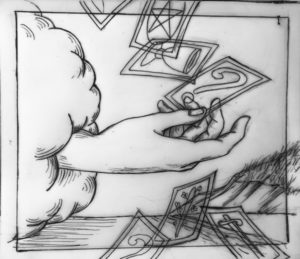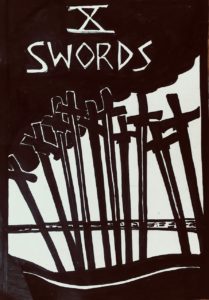 Artists, poets, therapists, fortune-tellers all understand that the urge to uncover meaning in an apparently random arrangement is an aspect of the human condition.
Artists, poets, therapists, fortune-tellers all understand that the urge to uncover meaning in an apparently random arrangement is an aspect of the human condition.
We long for personal messages whispered to us in the patterns of the wordless world — stars, dreams, inkblots, playing cards, smoke swirls, serendipities, coincidences, or even someone’s gaze.
At the same time, ashamed of that urge, we seek the hammer of hard facts as the antidote to such childish things. We turn to common science to renew our dignity (uncommon science loves the mystery within Mystery).
Common science tries to rip the veil off of a rainbow by explaining how one is made (as if that in itself weren’t a miracle). And so, in our culture, the idea of divination goes on the shelf with doves pulled from hats, seances, and Madame Blavatsky.
Yet few recognize that meaning, like comedy, arises only when what’s evident now is attached to what came before and what might come after. And because meaning requires projection, one person’s meaning may be another one’s nonsense.
Once upon a time a poet introduced me to a deck of tarot cards and my inner-artist, taught by the New York school of thought that contemporary art should have no ulterior meaning, fell bewitched. Every image in the deck was a global archetype. Every conscious detail, from the color of a sky to the pattern on a robe to the gesture of a hand, had symbolic significance. Best of all, when one picture was laid down in relationship to another a narrative was born. And what artist can resist a good story?
But how can a few cards predict the future? Like art, reading meaning into symbols is neither magic nor a trick, but just a sweet example of a cross-section cut from the quantum space-time continuum. Think of how a tree’s rings reveal the movement of time.
With or without paranormal paraphernalia, anyone, or any thing’s present moment is the result of what happened moments before, and, if you don’t alter the pattern, suggests what will naturally unfold after. And thus it is foretold.
Entertaining and far more ancient that an inkblot, a tarot card, the moment one chooses it, merely reflects what’s happening in our lives right now and, perhaps, what’s likely to happen if we don’t — or don’t want to — change that flow of events.
We can be surprised at the blind spots revealed and insights unmasked when a mere image loosens the straitjacket of our logical mind. And therein lies the magic.
And so for fun, or even as food for community thought, let me pull a card or two and see how it reflects the mood of the times, or the town, or even the person reading it.
The Question
What is one thing those of us on the Outer Cape should be aware of in the month ahead?
The Card

Ten of Swords. Wow. Our inaugural draw turns out to be one of the more difficult-to-understand cards, and I admit I was expecting something a bit more Pollyanna.
The Reading
The Ten of Swords is a depiction of a sacrifice. An affluent man is sprawled face-down on the edge of a shoreline with ten swords thrust in a line down his spine. Behind him a storm-blackened sky is slowly lifting to reveal the serene, golden one it had once engulfed.
As initially disturbing as the image is, keep in mind the cards do not represent physical events but instead are symbols of emotional states, so I’m here to convince you that the Ten of Swords is actually a card of hope.
The swords in the cards represent ideas in action. Sometimes we can’t wait for an old entrenched idea to die out on its own before the way clears for a new one. But to successfully force out an accepted community belief requires knowing that the community is behind you.
It takes only one blade to commit a mere murder, but in this case it was many (Et tu, Brute?) deliberately aligned, suggesting not a mugging but a ritualized sacrifice.
By formally sacrificing an old idea rather than simply denying its existence we show respect for its power.
By showing respect for its power we demonstrate the power of the new idea to replace it.
Then its old influence can wane as quickly as a storm recedes. If the gods like the taste of the sacrificed.
The real question is, who is the assassinated and who are the assassins?
Are we aghast or did we wield the swords?



